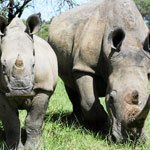
A prominent wildlife conservancy owner has labelled animal rights activists lobbying for the ban on trophy hunting as criminals, accusing them of raising money for personal gain under the guise of protecting wildlife.
By Wongai Zhangazha
Zimbabwe is among 12 leading countries in big game hunting alongside South Africa, Zambia, Namibia, Mozambique, Tanzania, Botswana, Cameroon, Republic of Central Africa, Ethiopia, Burkina Faso and Benin.
The country boasts some of the largest numbers of Big Five game — lions, elephants, buffalos, rhinoceros and leopards — favourites of trophy hunters who are mostly well off conservation and sustainable hunting orientated tourists from the United States of America, Central America, Middle East, Africa and Europe.
Save Valley Conservancy’s executive committee member and largest landowner Wilfried Pabst, in an interview in Harare recently, accused some non-governmental organisations of raising money on the basis of false promises by advocating for the banning of export of hunting trophies to Europe and the USA on the pretext of saving animals and promoting conservation.
Pabst’s views come at a time the EU and Zimbabwe, including other countries in the Sadc region, are rejecting the proposed ban on trophy hunting during the Convention on International Trade on Endangered Species (Cites) 17th Conference of Parties (COP17) currently being held in South Africa.
“I would describe some of these NGOs as criminals. Let’s understand their working model: [1] raise say $1 million, [2] retain between 10 to 20% for their own running expenses, [3] use the remaining $800 000 to 900 000 in this example to lobby governments in the northern hemisphere to either ban importation of hunting trophies or to ban sustainable hunting directly and [4] commit to their donors that this concept saves the lives of wild animals and their habitat. Nothing could be further from the truth,” said Pabst.
“The facts confirmed by our own experience and organisations like the IUCN [The International Union for Conservation of Nature and Natural Resources], WWF [World Wide Fund for Nature], UN and others are that income from sustainable hunting constitutes one of the two largest support elements of conservation on the planet in general and ensures the existence of some 75% of all wildlife areas in southern Africa and the countries mentioned above specifically.
- Chamisa under fire over US$120K donation
- Mavhunga puts DeMbare into Chibuku quarterfinals
- Pension funds bet on Cabora Bassa oilfields
- Councils defy govt fire tender directive
Keep Reading
Denying the sorely needed income from hunting would destroy areas the size of the UK plus Germany, together some 55 million hectares, eliminate some 20-25 million mammals in southern Africa alone.”
He added: “It would destroy hundreds of thousands of jobs and, counting their families, would render millions of people destitute. Therefore, promising their donors the saving and protection of wildlife, whilst the opposite is the fact, is deceiving these well-meaning people who would not donate one penny if they knew the traumatic effect their funds would have in the hands of these specific NGOs. But telling the truth would dry up their income stream, hardly anything these NGOs would voluntarily do.”
The German investor said wildlife ventures generally did not make a lot of money in most parts of Africa.
“Investing in conservation requires a rather philanthropic disposition and at best is described as capital intensive with a low and slow return. Therefore, taking one of the major pillars of income away would render most of these ventures loss making for ever and unable to survive,” he said.
“In any case, why is hunting some 0,5% of older excess male animals at large such a bad concept if the income generated protects the remaining 99,5% of mammals, as well as 100% of bird, reptile and insect live as well as the habitat for all? One needs to ask if these ‘concerned’ NGOs are concerned enough to replace the income lost through the ban of hunting or if these NGO’s have viable alternatives to overpopulations of game generated in fenced parks and conservancies.”
Pabst said due to the increase in the number of wild animals in the Save conservancy, they were proposing the trans-location of plains game and elephants to Mozambique but had not received permission from government to do so.
Refusing permission for trans-location would cause substantial die offs in the drought-stricken Save Valley Conservancy, because of the destruction of ecological balance, and that would be irresponsible, Pabst said.
However, conservationists claim that the argument that hunters are also “conservationists” are lies and they insist that trophy hunting is a lucrative business that has seen politicians at one time scrambling to get safari concessions in wildlife-rich areas.
They are pushing for the up-listing of elephants and lions from Appendix II to Appendix I at the on-going CoP17.











